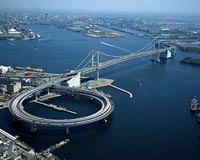 |
Osaka (AFP) March 22, 2011 High levels of radioactive substances have been detected in seawater near a quake-crippled nuclear power plant in Japan, its operator said early Tuesday. The substances were detected in seawater which was sampled Monday about 100 metres south of the Fukushima No.1 plant, a Tokyo Electric Power Co. (TEPCO) official said, stressing it was not a threat to human health. "Normally, such radioactive substances are not detected in the area," said Naoki Tsunoda, adding that the company will continue monitoring at the same point and in other areas. TEPCO said the level of iodine-131 was 126.7 times higher and caesium-134 was 24.8 times higher than government-set standards. The level of caesium-137 was also 16.5 times higher while that of cobalt-58 was lower than the standard, said Tsunoda. A 9.0-magnitude quake and ensuing tsunami on March 11 devastated Japan's northeastern Pacific coast, knocking out the plant's cooling systems and leaving it on the brink of a catastrophic meltdown. Helicopters and fire trucks have been deployed to pour water over heating fuel rods at the plant since Thursday.
earlier related report The emergency at the Fukushima No. 1 atomic power station, located 250 kilometres (155 miles) northeast of Tokyo, has sent radioactive material into the air, and sparked public anxiety about a more dramatic radiation release. The March 11 earthquake knocked out reactor cooling systems, and engineers have since battled to contain rising temperatures. Firefighters have sprayed tonnes of seawater onto the reactor fuel-rod pools at the complex. When asked about the possibility of contaminated water from the site flowing into the ocean, an official from Japan's nuclear safety agency told AFP: "Radiation monitoring will be conducted for seawater. "There is a possibility that a very small amount of radiation may flow into the sea. But even if it happens, considering the current radiation level in the air, there will not be an impact on human health," the official said. Abnormal levels of radiation have already been detected in samples of milk and spinach taken from areas near the plant, as well as in tap water in Tokyo and surrounding prefectures including Fukushima. Authorities in affected zones are now testing produce and other foods, but a health ministry official and a local official in Fukushima prefecture told AFP on Monday that so far, seafood was not being tested.
earlier related report "I know that many people are now worried about whether we might be affected by the problems... First and foremost, I can assure that you do not have to worry," he said in a radio speech. Citing experts, Lee said radiation from the plant in Japan's northeast has not so far had any impact on South Korea, and that winds were highly unlikely to sweep radioactive materials that far in any dangerous concentration. "Please do not be swayed by unfounded rumours or unscientific speculations about nuclear fallout," said Lee. Lee also tried to ease concerns over the country's own nuclear reactors, saying its 21 power plants could withstand "the biggest possible earthquake that could occur in the nation". Fears over radiation have spread online, prompting Seoul, the closest foreign capital to the crippled nuclear plant in Fukushima, to crack down on scaremongering and warn against panic buying. The nation's pharmacists issued an appeal Thursday for consumers not to panic-purchase iodine tablets, which can reduce the risk of cancer from radiation exposure, after callers flooded stores with requests for the pills. On the same day, police arrested a 28-year-old man in Seoul for spreading rumours through online messaging and text messages that radioactive materials would soon reach the peninsula. Seoul authorities have stressed that year-round westerly winds would blow any radiation from Japan out into the Pacific, while levels of radioactivity in South Korea have remained normal through the nuclear crisis. Radiation detectors have been installed at major port terminals and airports where visitors arrive from Japan. Inspectors have since detected higher than usual levels of radiation on five travellers, but levels returned to normal once they cleaned their coats and shoes.
Share This Article With Planet Earth
Related Links Space Technology News - Applications and Research
 Swiss embassy leaves Tokyo for Osaka amid nuclear fears
Swiss embassy leaves Tokyo for Osaka amid nuclear fearsGeneva (AFP) March 20, 2011 Swiss authorities said Sunday their embassy in Tokyo will temporarily move to Osaka amid fears that wind changes could carry more radioactive particles from Japan's stricken nuclear plant to the capital. "According to Swiss experts, the development of the situation of the damaged nuclear facilities in Fukushima is very uncertain," the foreign ministry said in a statement. "In addition, a ... read more |
|
| The content herein, unless otherwise known to be public domain, are Copyright 1995-2010 - SpaceDaily. AFP and UPI Wire Stories are copyright Agence France-Presse and United Press International. ESA Portal Reports are copyright European Space Agency. All NASA sourced material is public domain. Additional copyrights may apply in whole or part to other bona fide parties. Advertising does not imply endorsement,agreement or approval of any opinions, statements or information provided by SpaceDaily on any Web page published or hosted by SpaceDaily. Privacy Statement |